Expensive Bourbon Drinkers Just As Irritating As Other People With Money
“[T]he sublime taste of high-dollar Bourbons isn’t the only thing that whips fans into a frenzy (though that helps), it’s the thrill of the hunt and the bragging rights of having that bottle of, say, Jefferson’s Ocean or Pappy Van Winkle’s Family Reserve 23 year on display in the cabinet that helps bottles blow out the door before they even hit the shelves — Bourbon connoisseurs and now competing with collectors.”
The Pains Of Being Pure At Heart, "Simple And Sure"
I have got to say, not only did we already post this track a couple of weeks ago, this video here is “inspired by the culture of GIFs” and yet we are still putting it up anyway, which must mean that it is a pretty perfect song. Or that we’re lazy. It could be both, you know. Anyway, everybody shut the fuck up and listen to this, it’s great.
Group Advocates For Fake Smokers
“A smokers’ advocacy group says it has sued New York City seeking to overturn the city’s ban on electronic cigarettes.”
How Should We Deal With The Worst Of The Internet?
by Hope Whitmore
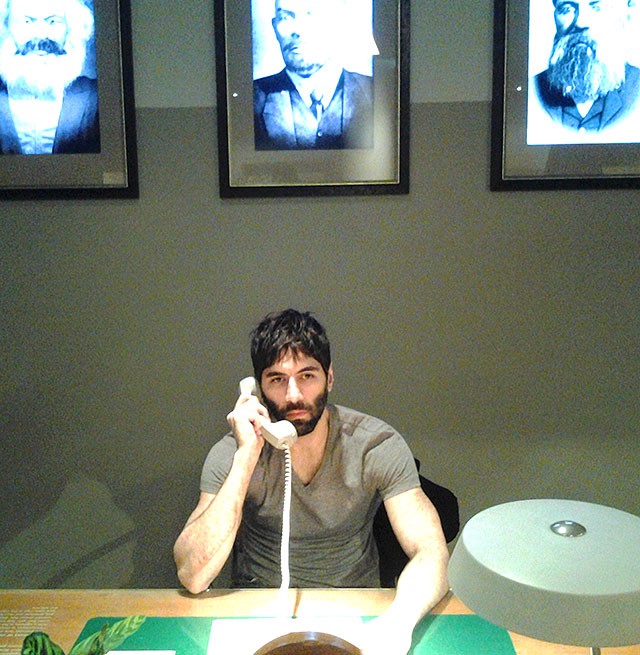
“We’re bombarded with poorly written and braindead pieces of content that are engineered to go viral for the sake of virality, not to educate and improve the individual or society,” wrote “Roosh V” on his blog the other day:
The internet has become a machine to fill gaps in your ego and self-esteem so that you receive the emotional benefits of validation…. The content you read now has moved from being primarily intellectual from the time of the Gutenberg press to primarily emotional. In the past, it was just too expensive to publish something with the intent to piss someone off or to gather lulz. Like with the first viral article in history (Martin Luther’s 95 Theses), you went through the hurdle and cost of publishing to educate or effect change. Only with the the beginnings of yellow journalism in the late 19th century did you start to see a shift towards more emotional offerings that would enrich publishers and advertisers at the expense of public discourse.
Roosh V — Daryush Valizadeh — is a pickup artist, author and kind of a philosopher too. His views on gender are radically conservative. His views on politics dovetail with his views on gender: He believes that “socialism, feminism, and cultural Marxism cause societies to decline because they destroy the family unit.” Described by Jezebel as ‘American-Woman Hater — Possibly the Worst Person We’ve Encountered,’ he writes travel pickup guides. They are called the ‘Bang’ guides, because they are about how to “bang” women in various countries. His personal blog was originally called DC Bachelor, back when he was worried about losing his job over his writing. There is also Return of Kings, which he describes a “politically incorrect men’s interest site.” One of its featured stories this morning was headlined “Women Have No Sense Of Justice”; it opened with Schopenhauer and ended with Nietzsche. He is 34, and a graduate of the University of Maryland.
But his recent writing about the way we use the Internet was striking for not only being thoughtful but for also not being objectionable. Much of what he publishes I find horrific; compelling for its awfulness, its contrarian message. It makes for uncomfortable reading. To be a woman and to read his sites is to be the strangest kind of voyeur.
And, in a pretty neat illustration of the problem of the “outrage Internet” and viral hate-reading, I actually had never heard of him before he appeared on Jezebel.
We first emailed for about a fortnight. I approached him honestly, saying that I didn’t agree with his values but that he interested me. He seemed friendly and professional. He answered my questions articulately. I often disagreed with what he said, but he was honest and straightforward. How should I reconcile this person as the same man who recently announced to his online community that they would be banned if they replied to a female commenter?

By email, I asked him how he became what he is. He’s written that women made him this way (“You made it very clear that being nice, chivalrous, and patient was not the way to have sex with you”), that they led him astray (“You made me forget about marriage”). He blames parents. In one of the most disturbing things he’s written, he describes how he warned his younger sister about men: “My brainwashing has worked on her, and the truth is she appreciates my lessons. She’s happy not to be like other girls her age, drowning in a shallow life of liquor and anonymous cocks.”
“I got to where I am by accident,” he wrote in an email to me. “I started a personal blog where I shared my successes and failures with getting laid. I posted regularly for several years while maintaining a corporate job. The blog gradually grew to where guys told me to write a definitive pick up guide. I did so and quit my job to travel. The book income was initially low, but then e-book devices got big and I was luckily one of the first to offer ebooks that you could put on any device. I would like to say that I am a business mastermind, but really I just wrote about topics that interested me (sex and travel). The only time I saw a gap in the market was before creating Return Of Kings in 2012. There was no politically incorrect men’s interest site, so I figured the universe was ready for one.”
His plan, he told me, was “to get as far away from Western culture and influence as possible to live in a place where tradition is more valued (I’m sure feminists are pleased at my self-imposed exile). I just don’t want to meet promiscuous women are are addicted to their smartphones.”
Roosh has blogged about why he insists on email format interviews: “During a telephone interview the reporter has a lot of leeway to paraphrase you,” he wrote. This is a valid concern for any subject. (Also, if you’re at the top of The Washington Post’s Most Hated Men on The Internet list, you’re going to be a bit more concerned.)
It’s certainly easy — and tempting — to cherry-pick the most controversial bits of an interview or pieces on his sites, while not even beginning to scratch the surface. When you do the former, you’re left with the notion that he is a troll — instead of someone with a deeply felt ideology. It’s easy to focus on the nastiest threads, the ones which make you bristle or feel a little sick — ‘Describe the ugliest/nastiest/fattest girl you have ever banged’ is a good example. Most of the boards are more mundane, with guys seeking advice, or looking to chat.
Roosh’s obsession is Western culture, and he believes that he is helping his readers navigate it. He believes Western culture is irreparably damaged. He has written much in praise of Ukraine — his final travel guide, published in January, 2013, is devoted to the country. I asked what he thinks of the current situation there. “From a purely selfish perspective, I would not want Ukraine to join the European Union,” he wrote. “I have seen with my own eyes how Western culture has corrupted women in terms of making them fat, short-haired, tattooed, masculine, entitled, and obsessed with soulless office careers. I would prefer Ukraine stay closer to more traditional Russia, where women know how to be feminine, than to embrace the more degenerate culture we see in the West.”
Despite that, it was not until our video chat that I realized how deeply horrified Roosh is by what he thinks Western culture has become.

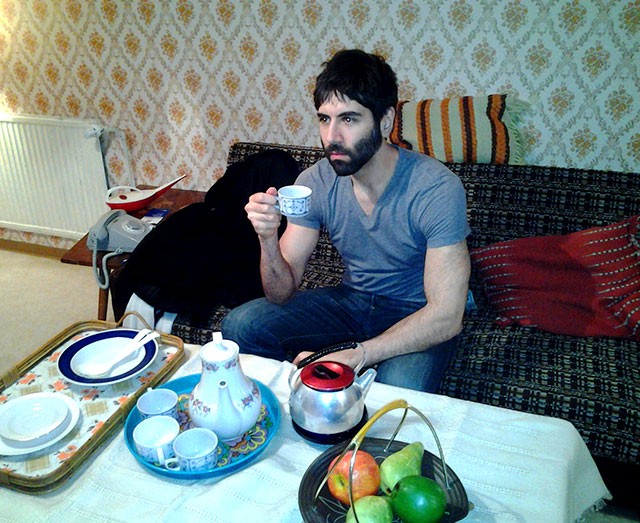
It was 1 a.m. my time, in the U.K., and 2 a.m. in Poland, when we started. Roosh wore a plain white T-shirt, and his shaggy brown hair and beard were much like they are on the graphic atop his website, which shows a featureless face fearlessly riding a red helicopter into the future. He sipped water as we spoke, reaching for it on a shelf far above his computer. He put on his makeup, he told me at the beginning. I hadn’t.
He seemed astonished by the level of hate he gets on the Internet.
“All we do is post what we want and like, and people threaten to take our website offline, they click the report button on Facebook. People write to me and say ‘I hope that you die.’ How well-adjusted are you as a human being if you read something on the Internet and you get so angry that you wish harm on someone?” he asked.
Wishing death on someone is massively not cool. When I mention this to my friends, even the most vehemently anti-Roosh agree with me.
People also called his father — “they actually called up my dad and said that I was a bad man. That wouldn’t occur to me ever, that if I disagree with someone’s views I would call their mum,” he said.
This, to Roosh, is another symptom of the sickness of Western culture. “People are so incapable now of handling opinion that goes against what they think is true that they freak out,” he said. “They are emotionally incapable of handling things. This is what the Western world has become — they are basically adults who have, who have the coping mechanism of kids, and at the same time these same kids, they’ve been told by the culture they’re ‘empowered’ and ‘independent’, and so on, so it’s really strange if you think, these people, they go to work, they own a home, they can pay their bills, clothe themselves, yet they read something on the Internet and go off and phone someone’s dad! Explain that. Why can’t people handle things?”
Then he goes on to say: “You know what, the feminist movement is is just one big excuse for women not to even try. Just don’t, don’t try. Just don’t even worry about anything, look like a pig and you’re great. It’s great because you’re fat and ugly, lazy girls.”
I don’t argue in this conversation; mostly, I just ask questions. I feel guilty about this when I am later transcribing the conversation. I also find myself wanting his approval, and I enjoy talking to him, even when he says the most ridiculous things. Later he will tell me to grow my hair and I will briefly consider it.
“Most people don’t have what it takes to be a good woman, a good man,” he said. “They don’t want to work, they don’t want to have to put in an effort. So here you have this ideology saying ‘you don’t have to work, don’t go on a diet, don’t try, don’t educate yourself on the truth of the world, just be as you are, go on the Internet all day and hate these things.’”
He changes his voice when he speaks as someone else — he uses a ‘dumb American’ voice, and his body language becomes impassioned, angry. He minds people not working on themselves; he says he believes in hard work. He’s learning Russian, he keeps fit, he reads widely, and of course he approaches women and perfects that like a skill one has to master, a talent one nurtures.
“You know, we have two opposing ideologies. One says ‘do whatever you want’ and the other says ‘work really hard, that’s life’ — 99% of people are going to go for the ideology which says they don’t have to try, they don’t have to work, and they’ll hate on the Internet, get involved in a new exciting war, go on, leave your comment, downvote that, report that. I say ‘Hey, you have to work. Go to the gym. You have to spend hundreds of hours to learn a language, you have to spend years to learn how to approach women, you have to work very hard, you know, who I am is not from a pill I took, it’s from years of writing and effort and no one wants to do that anymore, everyone’s so lazy, you know, no one wants to work. They’re happy to work at a job when a boss tells them, and they know how to go to a store — they’re very good at that, and that’s all, that’s all they’re good at.”
Then Roosh suggests that gay people are better treated than straight men in modern America. “I mean how does it get there? How does it get to the point where heterosexual men, especially men who are white, have less value than homosexuals? We are there. We are there. If you are a heterosexual man in this culture you are the lowest of the low. We’ve got to the point where if you are a heterosexual man you are at the bottom of this culture because you have ‘privilege’ and ‘patriarchy.’ You don’t deserve anything, while women accumulate their power and homosexual lifestyles are something we rate.”
I do not understand how someone can think this.
‘Yeah?’ I said, doubtfully, and he kept on talking.

“Have you seen the movie The Matrix? You’re familiar with the analogy,” Roosh said: “the red pill, the blue pill. And if you look at that, that’s like what some of us actually think is going on. Like what we were talking about the Internet…. the government makes sure people have their work, it makes sure they have their entertainment, that’s the version of this blue pill world, it’s very good to distract people, you know, to keep them occupied. Just keep them on the Internet where they can’t cause any real harm… and just let them get angry at Facebook at this guy called Roosh who made a bad comment, and let’s keep them on the Internet, because when people are on the Internet it’s not like they’re going to go march on the White House to say how the middle class is being destroyed.”
Return of Kings has also taken up arms against the Internet. “You’re not going to be on your deathbed wishing you had read more fucking blogs,” wrote “LoftBoy” last week, in a post titled “Stop Being Such A Fucking Faggot.”
Surely we can all get behind that sentiment, but it also embodies the difficulty of speaking with Roosh: You swing wildly and unexpectedly from agreement to disagreement. Also, isn’t there an irony in man like Roosh, who was made by the Internet, railing against it? We moved on.
“A compliment is as dangerous as an insult, because a compliment, if you believe it, if I tell you — ‘you are the best writer’ and you believe that, what do you think is going to happen to your writing? It’s going to go down,” Roosh said. “The moment a guy tells a girl ‘your face is so nice and so gorgeous’ she’s going to cut her hair off, because it’s like, ‘oh, great, my face so great, I can experiment shaving half my head.’ You know, don’t compliment people anymore, actually, if you want to hurt someone compliment them.”
“That’s interesting,” I told him, “because if one of my friends is say a painter, an illustrator, I’ll say her work is good, because it is, but also, because, you know, I want to be encouraging. I want her to keep doing it.”
“Yes, and she now thinks that the work is great because you gave her a compliment, she doesn’t improve on the work, and she fails because you compliment her. What a good friend you are. A horrible friend,” Roosh said.
He wasn’t kidding. It’s all black and white when you believe you are helping people navigate a toxic culture.
“You can’t fight the culture,” he said. “The wave is up to here and I mean, you can stand up to that wave but it’s going to crash on you and you’re going to be pulled into the ocean, so the best thing that I can do is give men a surfboard so they can ride the wave — at least they won’t drown and die, so I give men a way to navigate the world that we find ourselves in, and better or worse we have to deal with this.”
The next day he was going to go round the embassies and apply for visas. He wants to move farther east, to a Russian-speaking country. It depends on the visa. Somewhere he imagines there may be a satisfactory unspoiled country, where he’ll find that the women are thin and feminine, have long hair and can cook, and will make a man a drink. “There’s no perfect formula,” he said, “but women become more traditional and feminine the farther east you go as you get away from western culture. Their bodies are thinner, their hair is longer, they are more likely to wear high heels and dresses, they are more pleasant to talk to, they are less addicted to their smartphones, they don’t ‘play the field’ all day on OKCupid and Tinder, and they are more eager to get into long-term relationships than to adopt the party lifestyle where they sleep with a new guy every month.”
The idyll doesn’t exist, but it’s fine, every person deserves a quest, and at least he’s not sitting at home all day, staring into the Internet.
Hope Whitmore is a young writer who currently wanders between London, Edinburgh and Carcassonne, staying with family and friends, while seeking out interesting things to write about and people to interview. She is totally psyched for the Scottish Referendum in September as it will be completely crazy. Photos of Roosh in Berlin courtesy of Roosh.
"This group is advocating for a Trader Joe's"
“We are witnessing the loss of many neighborhood services, like grocery stores and laundromats, throughout New York. WE ALREADY HAVE A CHASE BRANCH AND A DUANE READE…”
— WHAT DO WE WANT?
St. Patrick's Day In Ireland, On Jameson
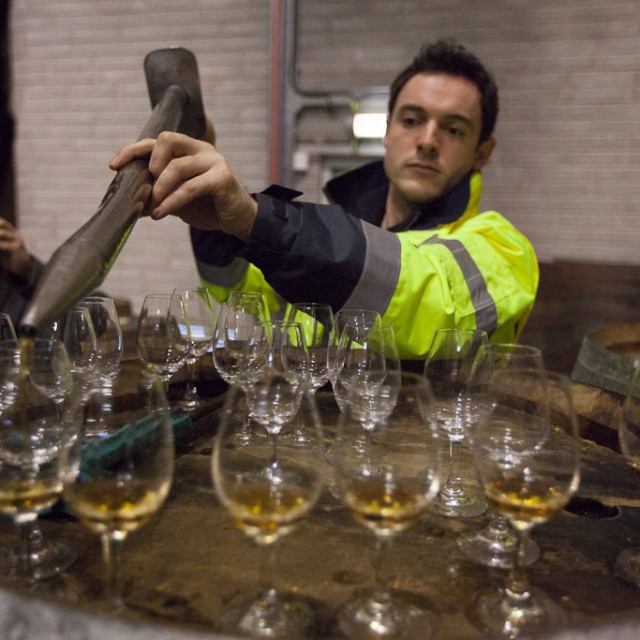

As we celebrate with all of our friends who make St. Patrick’s Day great, we raise a glass to Jameson for sponsoring this story.
A couple weeks ago Jameson funded a pre-St. Patrick’s Day party for us, and then last week they sent us (Awl publisher John Shankman and me) to Ireland, for actual St. Patrick’s Day. It was great: just a magical experience; so otherworldly, neat. (Get it? Ayyy.)
Anyway, they sent us there to tour the distillery, visit the Jameson whiskey academy, and generally experience what it’s like to hang out in Ireland, on and around St. Patrick’s Day, with locals. We went to a dozen or so pubs and restaurants, first near the distillery in County Cork, and then in Dublin. And this is the true story of what happens when people continue being polite and talk a lot about whiskey.
Haha, I just tried to remember anything that happened and my mind briefly went completely silent. But no, a highlight and starting point was the distillery tour with our international whiskey ambassador Dave, who was surprisingly young but seemed to know everything about Jameson, to the point where it was almost scary to imagine what kinds of tests he might have had to pass to get where he is now. He was also funny and kind (and cute). That’s him pouring some whiskey samples from a freshly opened barrel in the Jameson warehouse.


At lunch I asked Dave whether he thought that if there was ever a 28 Days Later-type situation and he was solely responsible for making whiskey for a group of survivors, start to finish, he’d be able to do it. He said he thought he probably could, but that it would end up being not Jameson but at least a serviceable alcohol, eventually. Later, during the Whiskey Academy he held, he explained in detail how it all gets made, and my favorite part was that he casually (unintentionally?) anthropomorphized so many parts of the process. Like when he was explaining that you have to trick the barley into thinking it’s spring so that it sprouts — [paraphrasing] “the barley seed starts to turn his own hard starch core into softer sugars, thinking that he’s going to grow tall, so that when we cook him we can then use his sugars.” It was the first time that the starch-into-sugar part of alcohol-creation had made sense to me, but it was also a little unexpectedly sad.
Dave also passed around a pot of brewer’s yeast, which smelled incredible. I’d love to learn more about yeast.
We also visited the old cooperage and learned a bunch of surprisingly riveting stuff about barrels (they are … the perfect vessel???), from Jameson master cooper Ger Buckley. Here’s Ger about to smear Jameson rep/barrel demonstration assistant Mary Anne’s face with inner-barrel charcoal. Later that night he also came out to the club with us, which was great.
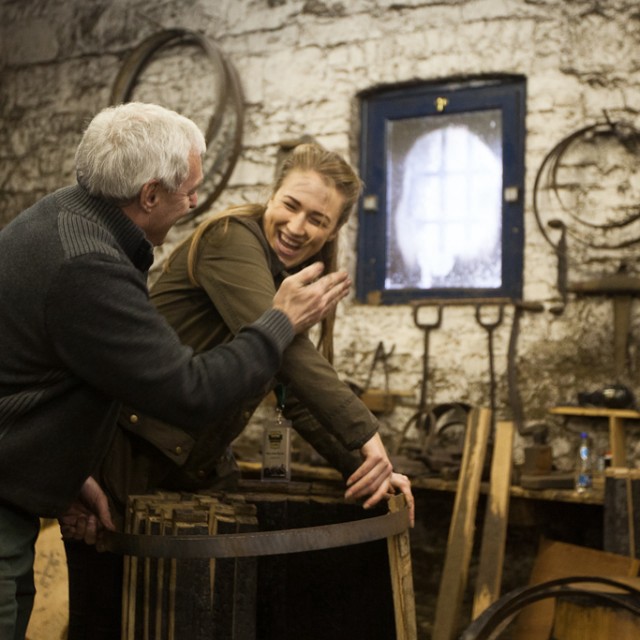
A few days later on the sidewalk, apropos of nothing, John said, “I want a barrel.” And I was like, “Me too!”
Hmm, what else. It was cool to hear that whiskey is the result of Irish monks encountering Arabic alembics (which, for booze, eventually became pot stills). Here’s Dave again in a composite pic, with the old Jameson pot still (which remains the largest in the world).
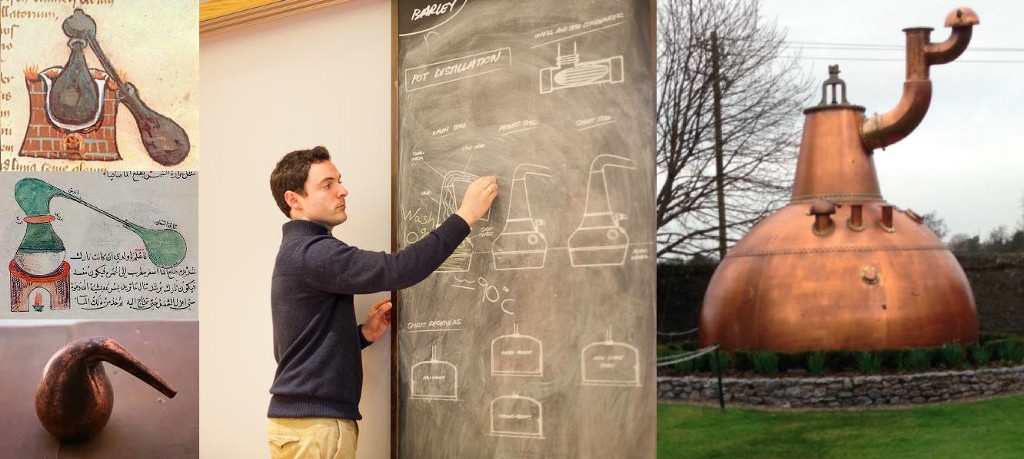
Basically, alcohol boils up out of beer, condenses, and slides out the side into a separate container. (Also, the word “whiskey” comes from the Gaelic phrase “water of life” — “uisce beatha” — which becamse “iska,” then “isky,” and now “whiskey.”)

We ate everything. We made friends. We watched Ireland win the Six Nations rugby tournament, which was spectacular and changed the way I feel about sports. We were sometimes late for the bus. We slept on trains. Here’s a terrible picture from my phone of our awesome photographer Daniel (hi, Daniel) en route from Cork to Dublin:
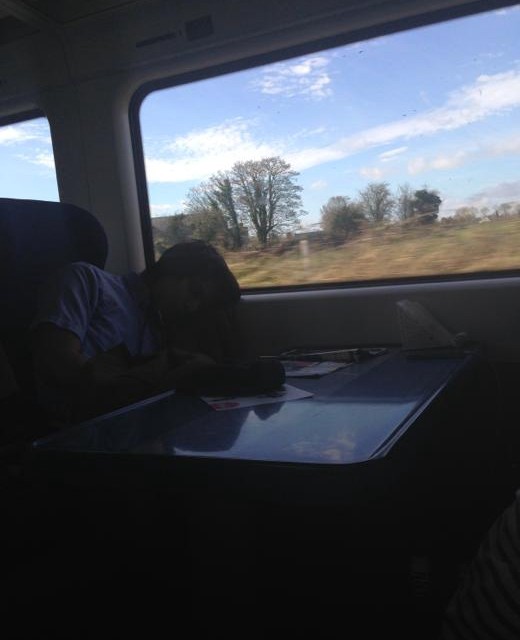
We went to a Jameson-sponsored acoustic concert at the Dublin distillery-museum/event space, where I befriended a guy who I subsequently learned was a barley farmer and was at the event for a friend of a friend. I gave him my contact info but he did not get in touch.
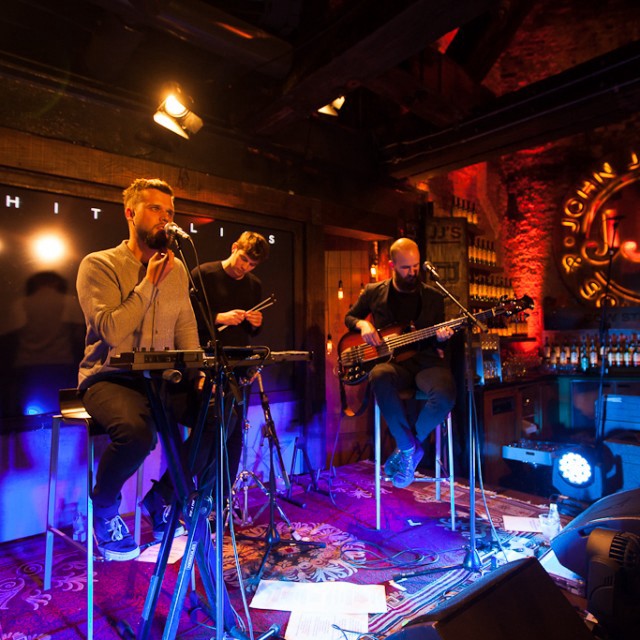

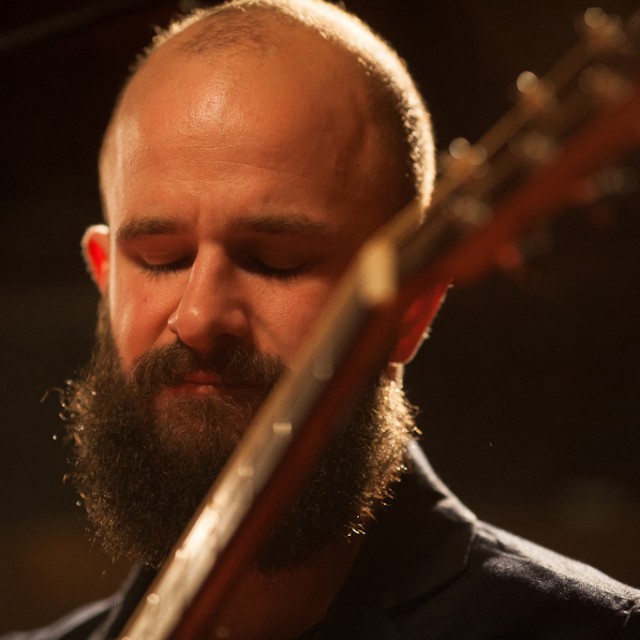
Then we went to another concert the next day, featuring the same headliners (White Lies) but open to the public and non-acoustic, in another part of Dublin. Some more pics:








We also went to a whiskey tasting on St. Patrick’s Day, during which the differences among Jameson 12 Year Special Reserve, Jameson Black Barrel, and Jameson Gold were described to us. It seems accurate that they did all taste balanced and smooth — John added that he still enjoyed the mid-palate smoothness of Black Barrel (see our first post). This tasting also came shortly after John took a breather in the distillery gift shop dressing room:
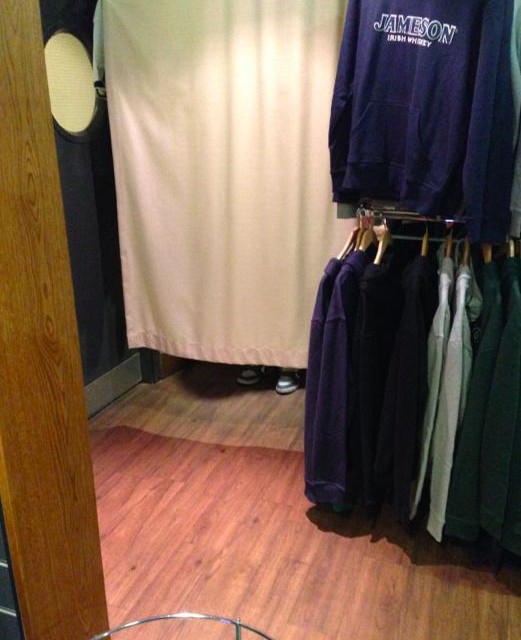
Overall, I think we had a great time (John? John says: “Honestly, it was an incredible trip and I feel lucky to have been able to go. I’m also impressed that the company behind Jameson — Irish Distillers Limited — only has 120 full time employees. A wise man once told me TIME + PRESSURE = DIAMONDS, but perhaps we should change that to TIME + PRESSURE = GREAT WHISKEY??”). It was fun and strange to spend a week with a bunch of new people, eating and drinking around Ireland on a whiskey brand’s dime, until it wasn’t strange anymore, and it was just fun and hilarious, and when we got on the plane to go home I surprised myself by genuinely missing people I hadn’t even known a week earlier. Aw. Is that too cheesy? John, help! Anyway, Jameson: making strangers friends, among other things, since 1780.
Also, at one point John and I were walking to the bus from some event, and I was babbling and giggling, because everything seemed kind of funny, and it was great to feel that way, and to remember that I used to feel that way more often, so I told John this, and thanked him for being awesome. It seemed like we were kind of having a moment, but then he said something along the lines of, “Word! That’s awesome, you should put that in the post.” And so here we are! Drink responsibly!
Next up (haha IT NEVER ENDS): The Wrap-Up.
Elsewhere: more photos and social-media ramblings.
Selfie Errors
“Thousands of pounds donated as part of the ‘#nomakeupselfie’ craze were sent to Unicef instead of Cancer Research UK by mistake, the BBC has learned. More than £2m has been raised after the craze of taking a self-portrait with no make-up spread virally. But those texting ‘DONATE’ rather than ‘BEAT’ found their money sent to the wrong charity. Others accidentally enquired about adopting a polar bear from the World Wildlife Fund (WWF).”
